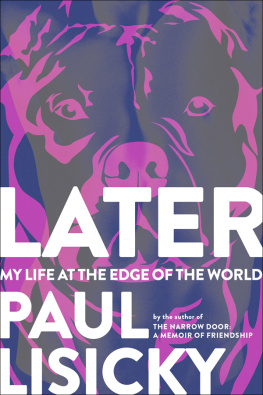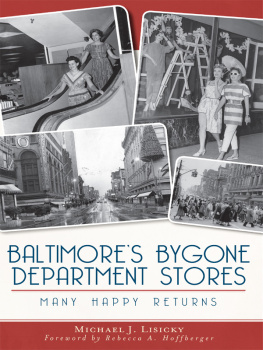Paul Lisicky - Later: my life at the edge of the world
Here you can read online Paul Lisicky - Later: my life at the edge of the world full text of the book (entire story) in english for free. Download pdf and epub, get meaning, cover and reviews about this ebook. year: 2019, publisher: Graywolf Press, genre: Detective and thriller. Description of the work, (preface) as well as reviews are available. Best literature library LitArk.com created for fans of good reading and offers a wide selection of genres:
Romance novel
Science fiction
Adventure
Detective
Science
History
Home and family
Prose
Art
Politics
Computer
Non-fiction
Religion
Business
Children
Humor
Choose a favorite category and find really read worthwhile books. Enjoy immersion in the world of imagination, feel the emotions of the characters or learn something new for yourself, make an fascinating discovery.
- Book:Later: my life at the edge of the world
- Author:
- Publisher:Graywolf Press
- Genre:
- Year:2019
- Rating:4 / 5
- Favourites:Add to favourites
- Your mark:
- 80
- 1
- 2
- 3
- 4
- 5
Later: my life at the edge of the world: summary, description and annotation
We offer to read an annotation, description, summary or preface (depends on what the author of the book "Later: my life at the edge of the world" wrote himself). If you haven't found the necessary information about the book — write in the comments, we will try to find it.
Later: my life at the edge of the world — read online for free the complete book (whole text) full work
Below is the text of the book, divided by pages. System saving the place of the last page read, allows you to conveniently read the book "Later: my life at the edge of the world" online for free, without having to search again every time where you left off. Put a bookmark, and you can go to the page where you finished reading at any time.
Font size:
Interval:
Bookmark:

Also by Paul Lisicky
Lawnboy
Famous Builder
The Burning House
Unbuilt Projects
The Narrow Door: A Memoir of Friendship
PAUL LISICKY
GRAYWOLF PRESS
Copyright 2020 by Paul Lisicky
The author and Graywolf Press have provided this e-book to you for your personal use only. You may not make this e-book publicly available in any way. Copyright infringement is against the law. If you believe the copy of this e-book you are reading infringes on the authors copyright, please notify Graywolf Press at: us.macmillanusa.com/piracy.
This publication is made possible, in part, by the voters of Minnesota through a Minnesota State Arts Board Operating Support grant, thanks to a legislative appropriation from the arts and cultural heritage fund. Significant support has also been provided by the National Endowment for the Arts, Target, the McKnight Foundation, the Lannan Foundation, the Amazon Literary Partnership, and other generous contributions from foundations, corporations, and individuals. To these organizations and individuals we offer our heartfelt thanks.

This is a memoir. Some names and identifying details have been changed to protect the privacy of individuals. Certain quotations have been reconstructed to the best of the authors ability.
Published by Graywolf Press
250 Third Avenue North, Suite 600
Minneapolis, Minnesota 55401
All rights reserved.
www.graywolfpress.org
Published in the United States of America
ISBN 978-1-64445-016-1
Ebook ISBN 978-1-64445-115-1
2 4 6 8 9 7 5 3 1
First Graywolf Printing, 2020
Library of Congress Control Number: 2019933480
Cover design: Kapo Ng
Cover art: Sam Chung @ A-Men Project (dog illustration)
Phase4Studios / Shutterstock (photograph)
For Polly Burnell and Elizabeth McCracken
The sand is the great enemy here. The sand drifts like snow, and sometimes the lower story of a house is concealed by it, though it is kept off by a wall. There was a school-house, just under the hill on which we sat, filled with sand up to the tops of the desks, and of course the master and scholars had fled.
HENRY DAVID THOREAU, 1865
*
The very houses are subject to change and move about as though not anchored to the land. In most places when a man builds a house he builds it and there it stands, practically unchanged. This is not true in Provincetown. Houses there do not remain upon their foundations. Formerly, every summer one saw houses cumbrously moving down the front street.
MARY HEATON VORSE, Time and the Town: A Provincetown Chronicle , 1942
*
This wasnt the sea of the inexorable horizon and smashing waves, not the sea of distance and violence, but the sea of the eternally leveling patience and wetness of water. Whether it comes to you in a storm or in a cup, it owns youwe are more water than dust. It is our origin and destination.
DENIS JOHNSON, Resuscitation of a Hanged Man , 1991
*
In Provincetown I was overwhelmed with this sky thing. It became a new character in my life and made me want to write poems. Then I realized there were skies everywhere, so that whole period of time I kind of made every poem I wrote touch the sky.
EILEEN MYLES, 1999
*
What happens to people out here on the Lower Cape, a mid-ocean sandspit, what happens even to intelligent and educated people, that they take to plying skies like cows in Chagall? From solid citizens they sublimed to limbless metaphysicians. Their minds grew lucent as gels. Or they slipped from supersaturation to superstition without passing through crystal.
ANNIE DILLARD, The Maytrees , 2007
*
Paul had begun to work out the taxonomy of Provincetown (should he say P-town?he wasnt sure): performers seemed to occupy a stratum between tourists and towniesweekender tourist, all-season tourist, short-season worker, long-season worker, year-rounder worker, queer townie, fisherman towniebut which one he wasnt sure.
ANDREA LAWLOR, Paul Takes the Form of a Mortal Girl , 2017
Were out on the driveway, my mother and I, leaning against my little red car. September 30. Its the first morning in months when its possible to stand outside and not be wrecked by the heat. Fourteen hundred miles to go, twenty-one hours; a stop in Beaufort, South Carolina; another in White Marsh, Maryland. Wed known this day was coming since May 1, when the writing coordinator phoned to tell me Id been offered the fellowship: a seven-month residency in Provincetown. Weve had plenty of time to take in the good news, but the day of my departure still seems to come out of nowhere. It is bad timing, but isnt it always? The good news flattens us, as if weve both come down with the flu, passed it between us, on the coolest, driest morning since April.
My mother looks back at the house: the tile roof, the arched window, the date palm sprawling over the tight, pineapple-shaped trunk. The lawn glistens. Sprinkler heads relax after hissing out water. She is probably telling herself its the house shed always wanted, the house shed invoked in a subversive challenge to my father: When you see me lying in the casket, do you want to say: I never bought her that house? So he bought the house, and to punish her, holds on to the New Jersey house, lives there alone amid a slop of bills, newspapers, and out-of-date engineering books, and comes down for a ten-day stretch only every six weeks.
She rubs her hands, arthritis twisting her forefinger, which she occasionally shows me just so she has a witness. Ive been back only eight months since grad school, but its also been a lifetime, as if Id never left home and known what it is to have an adult life. She wont let me know how much she loves me, wont say how much shes going to miss having someone to talk to, but instead channels those feelings into lists, asking me if Ive packed a razor, toothbrush, deodorant, contact lens solution, contact lens case, comb, dental floss, Q-tips, Band-Aids, blunt-tipped scissors: all the items so easy to pick up at a chain. She is driving me nuts, knows she is, but cant stop. Terrified of silence, shes lost her famous ability to laugh and listen. Not so long ago, on a trip to Morrisons Cafeteria, she talked incessantly for the full twenty-minute drive. I blew up and told her it was wrong to keep a running monologue, selfish not to leave any space for my response. Her face went red, as if Id seen right into her liver and heart. She knew what I saw: someone who had lost her friends, someone who told them her secrets, and thus she withdrew, or they from her, as if direct talk about, say, her dead twin brother or her gay son named after him were too much for anybody to take.
I cannot be her husband. She must know I cant accompany her to Home Depot forever, pour shock into the hot tub, fertilize bougainvillea by the downspout. But does she say she can take care of herself on her own? That would be expecting too much. She puts her arms around me so I will feel the consequence in my body, the consequence of her losing once again. And I hug her back even harder in my attempt to do the impossible: push dark feelings out of her and leave light in their place.
Maybe she thinks, Why should he get all the freedom I dont have? Go to grad school, come back home, go off for a fellowship. Why should his happiness spring from, depend upon, my disappointment? What kind of logic is that?
Font size:
Interval:
Bookmark:
Similar books «Later: my life at the edge of the world»
Look at similar books to Later: my life at the edge of the world. We have selected literature similar in name and meaning in the hope of providing readers with more options to find new, interesting, not yet read works.
Discussion, reviews of the book Later: my life at the edge of the world and just readers' own opinions. Leave your comments, write what you think about the work, its meaning or the main characters. Specify what exactly you liked and what you didn't like, and why you think so.








